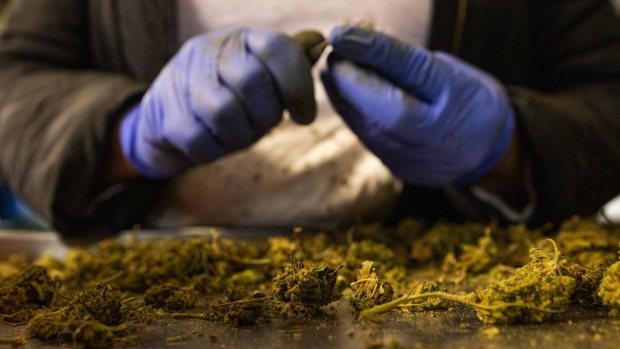Jun 7, 2021
Cannabis Derivative Delta-8 Has Its Supporters Despite Legal Woes
, Bloomberg News

(Bloomberg) -- Delta-8, the controversial cannabis derivative, has recently been banned in more than a dozen states. But some in the industry say the substance’s benefits shouldn’t be overlooked in the rush to crack down.
Last week, I reported that Delta-8 products, flying off the shelves of gas stations and smoke shops where CBD is sold, now face an organized effort by some of the largest cannabis producers to restrict them. It isn’t just that the substance falls into a regulatory gray area, undercutting licensed cannabis companies on price and taxes, it also often contains higher-than-allowed levels of THC (a.k.a. Delta-9 THC) and in some cases, dangerous heavy metals like lead and arsenic.
Read More: A Pot Knockoff Sometimes Made With Household Acid Draws Scrutiny
Many states are now moving to ban the substance outright. Only a handful, such as Illinois, Oregon and California, may allow for Delta-8 as long as it has been tested, verified and sold through the regulated marketplace, according to a recent report from the U.S. Cannabis Council.
Yet cannabis science, still in its infancy, has yet to determine Delta-8’s exact effects. And there are signs it could be useful. One study from 2010 points out that it’s a natural product of the degradation of Delta-9 THC, and found that it increased food consumption in rats. There are also anecdotal suggestions that it may be related to the food cravings experienced by marijuana users, known as the “munchies.”
The National Cancer Institute defines Delta-8 as having anti-nausea, anti-anxiety, appetite-stimulating, pain-relieving and neuroprotective properties. The institute also says Delta-8 is less potent than Delta-9, and there are reports that Delta-8 creates highs that don’t come with a side dose of paranoia.
Kim Rivers, chief executive officer of Florida-based Trulieve Cannabis Corp., told me last month that the company’s products that contain Delta-8 are popular with patients who have undergone chemotherapy. She added that the company doesn’t make a standalone product because they see it as more effective in pairings with other cannabinoids, but said it’s long been a part of the company’s offerings.
DD8, a New York-based company that recently launched a vaporizer for Delta-8, says the substance is appealing because it doesn’t make users feel paranoid like some products with Delta-9 do.
“It’s that functioning clear-mind component that you have, but your body has a dash of relaxation,” said co-founder Kylie Halperin. She said she takes Delta-8 on a regular basis along with a CBD tincture in her morning tea.
As regulations advance ahead of the science, it raises the question of whether the proverbial baby is being thrown out with the bathwater. Yet there’s no consensus that, outside of the regulatory headache it has created, Delta-8 is actually bad in and of itself.
Nonetheless, the substance is being shunned. In addition to state bans, cannabis insurance firms are moving away from Delta-8 THC, leaving companies that make it without product liability coverage and open to lawsuits, John Deneen, who leads the cannabis practice for insurance wholesaler Amwins, told me.
Charles Pyfrom, chief marketing officer for CannGen Insurance Services, one of the largest underwriters for the cannabis, CBD and hemp industry said in an email exchange that “the very blurred lines of the legality of Delta-8 THC” is just too difficult for insurers to deal with. The company’s policy, with rare exceptions for clients that have been “grandfathered in” by their existing relationship with CannGen, is now a strict “100% refusal rate of any company that touches or sells Delta-8 THC.”
NUMBER OF THE WEEK
- 50%: The number of new cannabis users that are using it more than 5 days a week, according to a forthcoming consumer trends report from Brightfield Group.
QUOTE OF THE WEEK
“Constellation Brands, with their large beer and wine business, have a lot of credibility with the alcohol distributors. Through our relationship with Constellation, we’ve signed a distribution deal with the largest alcohol distributor in North America to carry Quatreau and Martha Stewart CBD anywhere in the U.S. where you can buy wines or liquor brands. That’s how we are bringing a consumer product group organizational model to life,” said David Klein, CEO of Canopy Growth.
WHAT YOU NEED TO KNOW
- Amazon said it will change drug testing rules, and actively support legalizing marijuana in the U.S. The news prompted a rise in cannabis stocks.
- Canopy Growth’s fourth-quarter revenue missed estimates, but some analysts upgraded the stock based on recent declines in its valuation.
- Oklahoma’s governor signed a law amending provisions related to retail taxes on medical marijuana for excise tax purposes.
EVENTS
FRIDAY 6/11
- USA CBD Expo, a trade show, takes place in Atlanta. Event runs through June 13.
- NECANN Vermont Cannabis and Hemp Convention runs through June 12.
©2021 Bloomberg L.P.